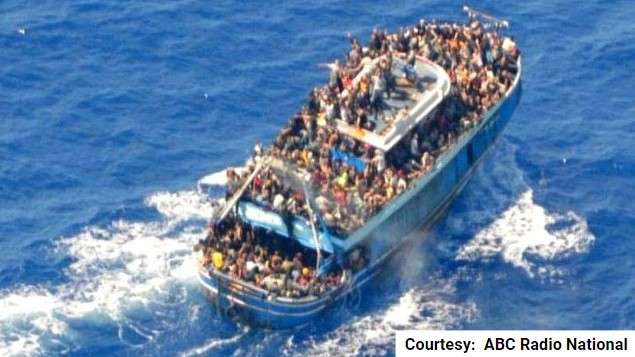NEWS

IN BRIEF
The recent tragedy of losing lives to human trafficking is a moment of reflection and much neglected Feminist perspectives is well-suited for this purpose. Feminist analyses of the economic causes of human trafficking of men in Pakistan looks at the exploitative economic system and structural inequalities which make men vulnerable to economic exploitation and trafficking.
SHARE
Introduction
The recent tragedy of losing lives to human trafficking is a moment of reflection and much neglected Feminist perspectives is well-suited for this purpose. Feminist analyses of the economic causes of human trafficking of men in Pakistan looks at the exploitative economic system and structural inequalities which make men vulnerable to economic exploitation and trafficking.
Propriety of Feminist Perspectives
The starting point of the Feminist analysis of the recent Greek tragedy is the recognition of it as an act of human trafficking not a criminal smuggling effort. This distinction is important as it does not criminalise the migrants in search of better economic opportunities but it holds accountable the exploitative system of capitalism which pushes individuals from marginalised and vulnerable backgrounds to illegally and dangerously cross international borders. Neo-liberal policies which promised economic growth, peace and prosperity have widened socio-economic differences within the developing world and between the developed and developing worlds. Feminist reading of the tragedy also brings to the discussion the most important indicator: intersectionality. The trafficked men are not privileged enough despite their gender compared to other men belonging to better socio-economic strata, in urban centres with Punjabi ethnicity and some skilled education. Most importantly, Feminist perspectives lays bare toxic masculinity and other stereotypes attached to being ‘man’ in a patriarchal society like Pakistan’s.
Interplay of Patriarchy and Capitalism
Human trafficking of men to developed world from developing is fuelled by profit-maximization instinct of capitalism. There is a demand for cheap, low-skilled labour in the developed world which is exploited by human traffickers. Lack of economic opportunity and poverty at home due to neo-liberal policies further marginalise uneducated and low-skilled men from rural and peripheral areas belonging to minority religion or ethnicity making them more susceptible to trafficking. Patriarchal norms compel men to seek better employment opportunities abroad resulting in exploitation and trafficking.
Intersectionality
Feminist interpretation of human trafficking of men realises the intersectionality of identities and experiences of men. Men too are vulnerable to trafficking. Men from marginalised communities are more vulnerable. Apart from lack of education and skills, religion, socio-economic class, and ethnicity are major indicators of vulnerability. These indicators combined with patriarchal norms and expectations further marginalise less privileged men.
Social Expectations- ‘Man of the House’
This tragedy shows how patriarchal social norms associated with men as the provider of the house fuel human trafficking. The social pressure on these men to uplift their families and households is immense because they are expected, taught and raised to be the ‘sole’ breadwinner of the household. With limited education and absence of growth opportunities in the peripheries, men from lower-socioeconomic backgrounds are compelled to look for opportunities elsewhere and abroad. Lack of skills or limited skills with rising influx of economic migrants to the developed world leaves these less privileged men to adopt illegal means of entry into developed world.
Gender Stereotypes
This tragedy also reveals the gender bias that men cannot be victims. Traditionally, qualities of strength and power are associated with masculinity. Then, to witness men being victims of patriarchy baffles society. Feminist analyses view men as also susceptible to trafficking. Men cannot be immune to crimes and victimhood. This acknowledgement by Feminist perspectives enables preventive measures to be taken to protect men and also to provide them with help.
Conclusion
To conclude, feminist perspectives on the causes of human trafficking of men in Pakistan reveals how men lose in a toxic patriarchal culture. Men too are stripped of agency. Men are expected to provide for entire households even if they die a salty death in a strange sea. These men from marginalised communities suffer because of lack of socio-economic privilege in a developing world dominated by neo-liberal policies.
*This Blog post is written by Mehwish Aziz. She is a Research and Communications Officer at Accountability Lab Pakistan.
